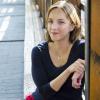by Keith Hautala
(Aug. 13, 2014) — University of Kentucky biologist Jeramiah Smith studies salamanders and sea lamprey to find genetic clues to regeneration. Smith works closely with colleague Randal Voss on sequencing the salamander genome. Both are in the Department of Biology in the College of Arts and Sciences.
"It’s 10 times bigger than the human genome, even though it probably contains essentially the same genes as the human genome," he said. "So there are lessons that can be learned about how organisms deal with all the DNA they have by looking at sort of this extreme example in salamanders. It can provide an important perspective on what the ancestral genome looked like."
Like salamanders, sea lamprey can regenerate

















